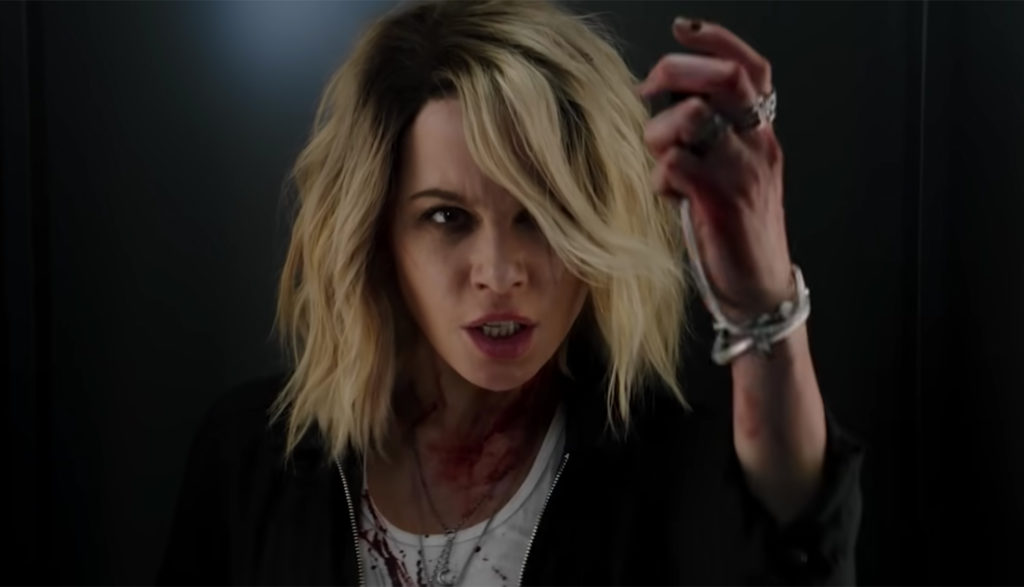
“What makes a person extraordinary?”
A mysterious narrator poses this question in the opening moments of Jolt. “Everybody wants to be normal,” she continues. “But nobody wants to be ordinary.”
Lindy Lewis is a lot of things, but ordinary is certainly not one of them.
Lindy was born with a strange genetic condition that doctors called “Intermittent Explosive Disorder”. Basically, she has a heightened tendency towards violence, one that her body will force her to act on if she’s not careful. Every slight annoyance has the potential to set her off on a brutal rampage.
Lindy’s parents and doctors quickly realized that her condition made her a danger to those around her, so she grew up in solitary confinement. A team of doctors and scientists experimented on her in attempts to find a cure, but nothing was able to stem her destructive tendencies—until they invented a vest that would allow Lindy to self-administer an electric shock every time she felt an inclination toward violence.
Brutal? Definitely. But effective.
While Lindy is able to subdue her outbreaks by shocking herself, it’s not a long term solution. Being separated from her vest for even a few seconds is incredibly dangerous both for her and the innocent people around her. But no matter what she does, what she tries, she hasn’t been able to find a real cure.
That is, until Justin.
Lindy’s psychiatrist sets her up on a blind date in order to test how she functions in an average social situation. But after just two dates, Lindy finds herself falling in love. Sure, Justin’s just an ordinary accountant, but he’s nice, and he expresses an interest in her that she’s never experienced from anyone before. Being with him even subdues her tendency towards violence; she’s able to take off the vest around him with no reprecussions. For the first time, Lindy begins to hope that maybe, just maybe, she can be cured after all.
And then Justin turns up dead with two gunshot wounds in his head.
Turns out, Justin wasn’t so ordinary after all. He was actually an accountant for the feared Gareth Fizel, a crime lord so powerful no one dares to cross him—at least, no one until Lindy. Armed with her electric vest, her headstrong nature, and a whole lot of anger, Lindy sets out on a mission to find the people who killed Justin and take them down, no matter how many bodies she has to leave in her wake.
The majority of the time, Lindy doesn’t want to hurt people—at least, not innocent ones. She begs her driver to let her out of the car when she feels an outburst coming on and doesn’t have her vest, and she sometimes separates herself from innocent people to avoid losing control around them. When she confesses how she deals with her condition to Detective Vicars (the officer assigned to Justin’s case) he tells her, “You know what that tells me about you? You’d rather hurt yourself than somebody else.”
Vicars is sympathetic toward Lindy, giving her multiple chances to turn herself in and cooperate with the investigation after she breaks the law trying to find Justin’s killer (His partner, Detective Nevin, is not nearly as compassionate.) He’s determined to give her as many chances as possible to do the right thing.
In a montage showing Lindy trying various methods of dealing with her condition, we see her attempting meditation. She also makes a reference to evolution.
Lindy and Justin flirt heavily on their second date, referencing masturbation and BDSM. Justin tells her about a time when his date listed every venereal disease she had ever contracted. Later, we see the two making out and clothes start to come off. Justin is shown briefly naked from behind and we see some graphic sexual motions.
Lindy is shown in a sports bra as well as underwear a few times. Multiple men go shirtless at an underground fight club. Sexual references are constant, including mentions of both male and female genitalia.
Lindy takes a photo of two women holding hands in the city.
(A note: Detective Nevin is played by Laverne Cox, a transgender woman; the character is played as a woman throughout the film, and no references are made to the actor’s sex or gender identity.)
Buckle up, because this is a long one.
Obviously, the nature of Lindy’s condition lends itself to many violent situations. Flashbacks to her childhood show her beating up a boy with a baseball bat, though we don’t actually see any of the impacts land. As a teenager, she beats up several doctors by kicking them in the crotch or slamming their heads into walls.
The violence doesn’t stop when Lindy reaches adulthood. Often, when she’s feeling an outburst coming, we see brief glimpses of what she’s imagining doing—slamming someone’s foot in their car door repeatedly, stabbing them with a steak knife, snapping their neck, etc. Most of the time, she shocks herself and is able to snap out of it, but as the film continues, we see more and more of her imaginings come to fruition. Punches and kicks are thrown with abandon, with Lindy occasionally losing control and letting lose a series of brutal attacks on her opponents. While facing off against three attackers at a fight club, she takes down one of the men and punches him in the face repeatedly, long after he’s already admitted defeat. One of her more disturbing acts of violence occurs when Lindy’s vest malfunctions and, unable to control herself, she assaults a rude waitress and bashes her head repeatedly into the wall of a bathroom stall. (We see the waitress obviously breathing afterward, letting us know that Lindy didn’t kill her.)
Another more graphic incident involves Lindy tying her target over the open hood of her car and electrocuting his genitals with jumper cables. Nothing explicit is shown, except for the bright shock and the victim’s expression of pain.
Lindy imagines stabbing her psychiatrist Dr. Munchin in the neck, and blood sprays out onto the screen. She also has a vision of shooting Detective Nevin in the head point blank; we see large splatters against a glass window. At the fight club, Lindy rips out a few of her opponent’s body piercings, sending blood flying. One of Fizel’s henchmen attempts to kill her by draining out her blood, but she breaks free and splashes it onto his face to incapacitate him. Later, she uses the same henchman’s severed thumb to obtain a DNA sample.
The f-word is used around 55 times throughout the film, and the s-word is heard about 15. “B–ch” is used four times, and the c-word is spoken once. Profanities such as “h—,” d–n,” “a–,” and “d–k” appear occasionally. British expletives “tw-t” and “b—ocks” are used a few times as well. God’s name is taken in vain five times.
The narrator mentions that Lindy’s mother was addicted to medication, while her father was an alcoholic. We see glimpses of Lindy herself trying various medications in an attempt to control her condition, and Dr. Munchin injects a sedative into her neck in order to calm her down. Lindy also wears a t-shirt that features a graphic of a bottle of pills.
Lindy takes a shot of liquor. Both Fizel and Justin are shown drinking glasses of wine. A bouncer smokes a cigarette outside of a club.
In the opening exposition, the narrator calls Lindy’s condition a “gift.” Lindy herself might not agree—the film does everything in its power to convince us that she hates it—but her actions throughout the story say otherwise. “Some people cry, some people drink, some people write s— poetry,” she tells Dr. Munchin. “I hurt people. Might as well put it to good use.”
Lindy isn’t exactly the most honorable of heroes. The film revolves around her quest for vengeance and the extreme lengths to which she’s willing to go to get it. She breaks into the police station to steal evidence, leading the detectives investigating Justin’s murder on destructive car chases and refusing to cooperate with them. At one point, when she’s trapped in the nursery room of a hospital with Detective Nevin, she even tosses the babies at her, forcing the detective to catch them. There’s very little Lindy isn’t willing to do to accomplish her goals.
Crude humor is used occasionally; Lindy claims that “British people don’t fart,” and Dr. Munchin jokingly mentions that she should try drinking her own urine as a potential treatment. “I’ve tried that, actually,” she responds, much to the doctor’s disgust.
[Spoiler Warning] Betrayal plays a huge role in the film’s plot. By the end of the story, Lindy realizes that almost everyone she thought she could trust, from Justin to Dr. Munchin, has secretly been using her for her abilities and doesn’t care about her the way she thought they did.
What makes a person extraordinary?
If the definition of “extraordinary” is simply “out of the ordinary,” then that’s Lindy to a T. If you take it to mean “remarkable” or “exceptional,” however…maybe not. Unless you mean “remarkably violent” or “exceptionally problematic.”
Jolt is frustrating in that it doesn’t give its audience much to root for. Lindy might not want to hurt innocent people, but that doesn’t exactly make her a hero—nor does the extensive trail of bodies she leaves behind. Her mission—to exact brutal revenge after the murder of a man she knew for two days—is difficult to get behind.
Pile that onto some strong sexual content, constant violence and a profanity-laced script, and Jolt might be an endeavor worth skipping.


Lauren Cook is serving as a 2021 summer intern for the Parenting and Youth department at Focus on the Family. She is studying film and screenwriting at the University of North Carolina School of the Arts. You can get her talking for hours about anything from Star Wars to her family to how Inception was the best movie of the 2010s. But more than anything, she’s passionate about showing how every form of art in some way reflects the Gospel. Coffee is a close second.